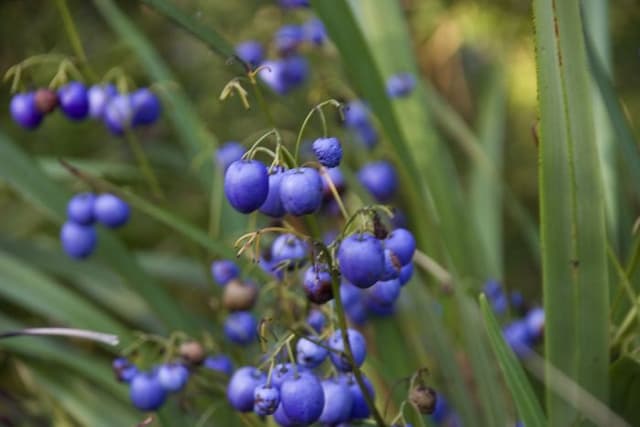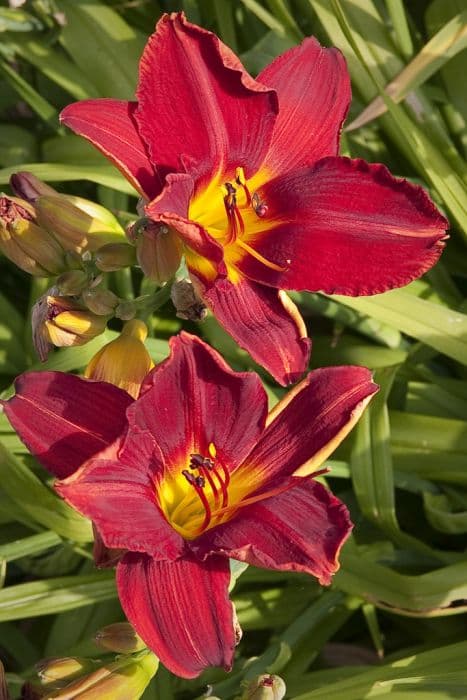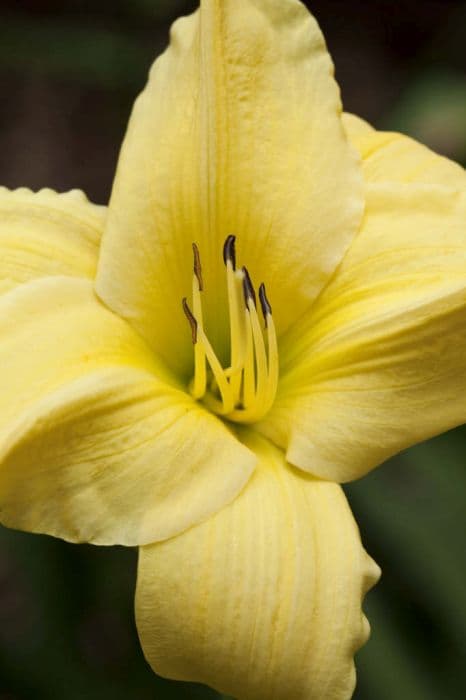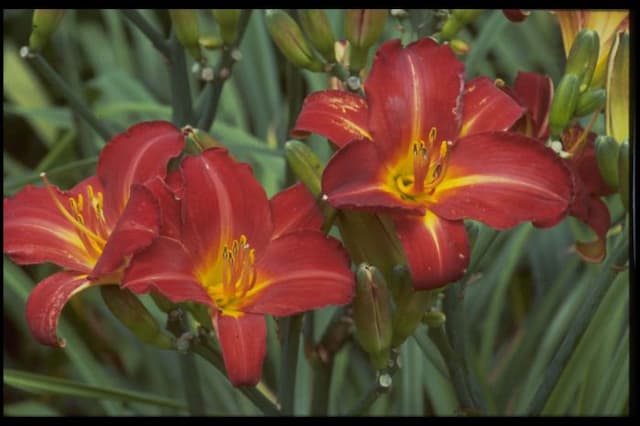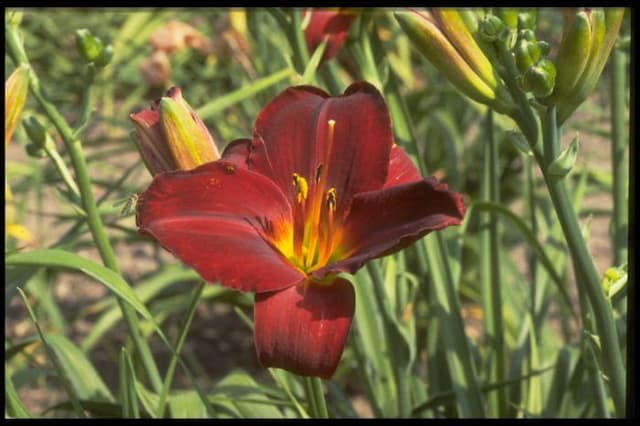Daylily Hemerocallis 'Little Wine Cup'

ABOUT
The Hemerocallis 'Little Wine Cup', commonly known as the Daylily, has a striking appearance characterized by its vibrant blooms and lush foliage. The plant produces beautiful flowers that are shaped like open cups, and as suggested by its name, these blooms boast a deep wine-red color that gives them an eye-catching and luxurious look. Each flower features slightly ruffled edges and often a lighter throat, contrasting with the rich tone of the petals, sometimes giving a gradient effect from the center outwards. The Daylily's foliage consists of long, slender leaves that arch gracefully. These leaves are a lush green color, creating a lovely backdrop that makes the wine-colored flowers stand out even more prominently. This foliage forms a dense clump, from which the flower stalks emerge, elevating the blooms above the leaves so they can sway gently in the breeze. While the details about the specific dimensions are to be avoided, it's worth noting that the flowers are proportionately sized to make a visual impact and are produced in abundance during the blooming period. The Daylily is well-loved for its hardiness and ability to produce a profusion of flowers that are often seen basking in the sun, creating a picturesque scene in any garden where they are planted.
About this plant
 Names
NamesSynonyms
Daylily
Common names
Hemerocallis 'Little Wine Cup'.
 Toxicity
ToxicityTo humans
The plant commonly known as daylily is not toxic to humans. In fact, many parts of daylilies are edible when properly prepared. However, it is crucial to correctly identify the plant as certain varieties of lilies can be highly toxic, and mistaken identity could lead to serious health consequences. Consuming the wrong plant may cause symptoms ranging from gastrointestinal distress to more severe reactions such as kidney failure, particularly in the case of true lilies (Lilium species). Always ensure you are consuming the correct species and part of the plant when it comes to foraging for daylilies.
To pets
Daylilies are toxic to cats, with potentially severe consequences if ingested. The ingestion of any part of the plant can cause acute kidney failure in felines. Symptoms of daylily poisoning in cats can appear within a few hours and may include vomiting, lethargy, loss of appetite, and increased urination followed by a lack of urination after 24 hours. If a cat is suspected to have ingested daylilies, immediate veterinary attention is essential. Dogs are less sensitive to daylilies, but ingestion could still cause mild gastrointestinal upset. It’s best to keep all parts of daylilies out of reach of pets to avoid any complications.
 Characteristics
CharacteristicsLife cycle
Perennials
Foliage type
Deciduous
Color of leaves
Green
Flower color
Purple
Height
1 foot [30 cm]
Spread
2 feet [60 cm]
Plant type
Herb
Hardiness zones
Varies
Native area
Asia
Benefits
 General Benefits
General Benefits- Easy to grow: Hemerocallis 'Little Wine Cup', commonly known as Daylily, is a hardy perennial that adapts to a wide range of soils and conditions.
- Drought-tolerant: Once established, Daylilies are fairly drought-resistant, reducing the need for frequent watering.
- Low maintenance: This Daylily requires minimal care, making it an ideal plant for gardeners with limited time.
- Long blooming: The 'Little Wine Cup' flowers during the summer, providing a prolonged display of blooms.
- Attracts pollinators: The colorful flowers attract butterflies and bees, promoting pollination in the garden.
- Diverse landscaping uses: Daylilies can be used in borders, edging, and as ground cover, offering versatility in landscaping design.
- Rapid growth: 'Little Wine Cup' can quickly fill in garden spaces, making it an effective choice for gardeners looking to establish a full garden rapidly.
- Propagation: This plant can easily be divided to produce new plants, helping gardeners expand their garden or share with others.
- Variety of settings: Suitable for urban, suburban, and rural gardens, Daylilies are versatile in their planting location.
- Seasonal interest: The foliage of Daylilies often changes throughout the season, adding interest to the garden even when not in bloom.
 Medical Properties
Medical PropertiesThis plant is not used for medical purposes.
 Air-purifying Qualities
Air-purifying QualitiesThis plant is not specifically known for air purifying qualities.
 Other Uses
Other Uses- The Daylily 'Little Wine Cup' can be used as a natural dye source, especially from its vividly colored petals, providing shades of yellow, orange, or red depending on the mordant.
- Petals of the Daylily are edible and can be used to add a colorful garnish to salads or desserts, offering a slightly sweet flavor and crunchy texture.
- These plants can be integrated into a permaculture garden as they are hardy, adapt well to various conditions, and can help stabilize soil and ecosystems.
- Daylilies can serve as companion plants in the vegetable garden, potentially deterring certain pests with their strong scent and dense foliage.
- The sturdy leaves of Daylilies can be used in floral arrangements or wreaths as a green filler, adding texture and volume.
- Dried Daylily petals can be incorporated into homemade potpourri mixes, contributing color and a light floral scent to the mixture.
- The Daylily 'Little Wine Cup' can be used in border landscaping to create a dramatic visual impact with its deep color, especially when planted in mass groupings.
- This Daylily variety can be used as an indicator plant in gardens as it starts to wilt when water is scarce, alerting gardeners to dry soil conditions.
- Fibers from Daylily leaves can be used in traditional craftmaking, such as twisting them into twine for garden use or weaving small baskets.
- The flowers of the Daylily can be used to infuse oils or vinegar, imparting a subtle floral flavor suitable for culinary experimentation.
Interesting Facts
 Feng Shui
Feng ShuiThe Daylily is not used in Feng Shui practice.
 Zodiac Sign Compitability
Zodiac Sign CompitabilityThe Daylily is not used in astrology practice.
 Plant Symbolism
Plant Symbolism- Beauty: The elegant form and striking colors of Daylilies, such as 'Little Wine Cup', signify beauty and grace in the plant world.
- Longevity: Daylilies are known for their ability to survive with minimal care, and 'Little Wine Cup' shares this trait, symbolizing long life and endurance.
- Motherhood: In Chinese culture, Daylilies, including the 'Little Wine Cup' variety, are a symbol of motherhood and the nurturing aspect of parents.
- Rebirth: The 'Little Wine Cup' Daylily, like others in its genus, blooms anew each day, representing the idea of renewal and the dawning of new opportunities.
- Forgiveness: The transient blossoms of Daylilies suggest the ephemeral nature of sorrow and the importance of forgiving and moving forward.
 Water
WaterDaylilies, including the 'Little Wine Cup', should be watered deeply about once a week, providing approximately 1 inch of water each time. The best method is to water at the base of the plant, avoiding overhead irrigation, which can lead to leaf disease. During dry spells or hot weather, increase watering to twice a week. Each watering session should provide enough water to moisten the soil to a depth of about 8 inches. It's crucial to ensure the soil is well-drained to prevent waterlogging, as daylilies do not tolerate standing water.
 Light
LightDaylilies, such as the 'Little Wine Cup', thrive in full sun to partial shade. The ideal location would receive at least six hours of direct sunlight per day. However, in extremely hot climates, they benefit from afternoon shade to protect them from intense heat. Choose a spot that provides bright, indirect light for the rest of the day for optimal growth and bloom.
 Temperature
TemperatureThe 'Little Wine Cup' daylily tolerates a wide range of temperatures and is hardy in USDA zones 3 through 9. The plant can survive minimum winter temperatures down to -40 degrees Fahrenheit, and during the growing season, it prefers temperatures ranging from 60 to 75 degrees Fahrenheit. Daylilies can withstand summer highs up to 90 degrees Fahrenheit, but adequate watering during these periods is important to prevent stress.
 Pruning
PruningPrune 'Little Wine Cup' daylilies to remove dead foliage and spent flower stalks, which encourages reblooming and maintains the plant's appearance. Pruning is often done throughout the flowering season to enhance the plant's vigor. The best time to do a full clean-up pruning is in the late fall or early spring to prepare for new growth. Remove any dead leaves, stems, or flowers by cutting them back to the base to promote healthy new shoots.
 Cleaning
CleaningAs needed
 Soil
SoilDaylilies, including 'Little Wine Cup', thrive in moderately fertile, well-drained soil with a pH between 6.0 and 6.8. A mix containing loamy garden soil, compost, and a bit of sand or perlite to improve drainage is ideal.
 Repotting
RepottingDaylilies such as 'Little Wine Cup' don't often require repotting as they are usually grown in the ground. If grown in containers, repot every 2-3 years or when overcrowded.
 Humidity & Misting
Humidity & MistingDaylilies like 'Little Wine Cup' are tolerant of a wide range of humidity levels and do not have specific humidity requirements. Normal outdoor humidity is generally sufficient.
 Suitable locations
Suitable locationsIndoor
Ensure bright light and consistent moisture for 'Little Wine Cup' indoors.
Outdoor
Plant 'Little Wine Cup' in full sun to partial shade in well-drained soil.
Hardiness zone
3-9 USDA
 Life cycle
Life cycleThe Daylily 'Little Wine Cup' starts its life as a dormant rhizome or tuberous root, which sprouts in early spring when the soil warms. New shoots emerge from the rhizome and develop into long, strap-like leaves, forming a clump that grows larger each year. As the plant matures, flower scapes, which are leafless stems, shoot up from the base and bear numerous buds. These buds open into the distinctive 'Little Wine Cup' wine-red blooms, each lasting only a day, hence the name daylily, throughout the late spring to early summer. After flowering, seed pods may form, and if not deadheaded, they can drop seeds creating new plants, though many hybrids including 'Little Wine Cup' are often sterile and propagated by division. The plant then enters a period of dormancy during the cold months, withdrawing nutrients back into the rhizome to survive the winter and restart the cycle in the following spring.
 Propogation
PropogationPropogation time
Spring to early summer
Propogation: The most popular method of propagating the daylily 'Little Wine Cup' is by division. This process is best done in the spring or early fall. To propagate by division, carefully dig up the clump of daylilies, making sure to lift the entire root system out of the ground gently. You can then use a sharp spade or knife to split the clump into smaller sections, each with a few fans of leaves and a portion of the root system. Replant the divisions immediately, setting them at the same soil depth they were previously growing at, and water them thoroughly. This straightforward method not only helps to create more plants for the garden but also revitalizes older clumps that might have become overcrowded, ensuring continuous vigorous growth and bloom.
